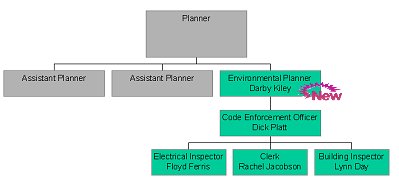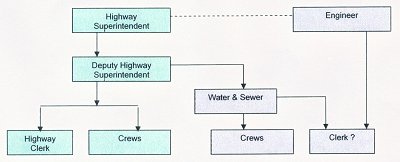- By Dan Veaner
- News
 Print
Print
Lansing is the fastest growing town in Tompkins County. With over a hundred new homes in the works, political pressure from the County to encourage affordable housing, and the town's geographical desirability that trend will only escalate, at least in the near future. For the past half dozen years the Town Board has been looking at ways to handle this growth. "The 2010 Committee back in the 1990s looked at it, we looked at it maybe five years ago when Meg Overstrom was on our board" says Deputy Supervisor Bud Shattuck.

Lansing Environmental Planner Darby Kiley
Last October the Town Board roughed in a plan to create two new departments, a Planning Department and a Department of Public Works. Each envelops existing departments, but expand their roles to better serve the town. On January 2 the first steps were taken to initiate the Planning Department when the Town hired Darby Kiley as Environmental Planner and department head. "We looked at what's the best way to do that, Shattuck says. "We looked at other towns, and said that in most cases you would have a planning department, because planning is the overarching piece of how you determine what that growth is going to look at."
Last year Kiley worked part-time for Lansing, writing grants and involving herself in new initiatives like the Salt Point Management Plan. Town Board members found she was a valuable resource, bringing expertise and grant money to the town. A grant for solar panels on the Highway Department building amounted to $129,870. If a pending $183,242.32 grant from the NYS Department of State Shared Municipal Services Incentive Grant Program is approved, officials say it will pay for 90% of the new salt storage building. "She pays for herself," Shattuck notes.
When they decided to implement the Planning Department, it was a natural step when Kiley applied for and got the job. Kiley says that there needs to be a connection between town planning and implementation, code enforcement and zoning. "I think bringing in a planner helps to make that connection and shows residents that we are thinking about how the Town needs to develop," she says.
Kiley will continue to research and write grants, but will have expanded duties. In addition to supervising her department, she will work closely with the Planning Board, and will take over some tasks that the Town has payed consultants to do. "We're paying (engineer) Dave Herrick to do a lot of work that we can do in-house with planning personnel," Shattuck says. "So Darby can do all of the SEQR work that Dave does."
The departments are being created from the bottom up. While Kiley's position is above the Code Enforcement Office in the hierarchy, another planner position is penciled in above hers, though there are no current plans to fill it. And when the time comes to fill in other positions they may change, depending on the Town's needs at the time. "We thought as we add small pieces and add people into the departments, or shift some of the work into other departments or inter-departmentally, that we'd set something up that even after this board is gone and other boards come in, there is a framework for them to work with," Shattuck explains.
A native of Carlisle, PA, Kiley took her undergraduate degree in chemistry and environmental studies. She has a Masters degree in Natural Resources from Cornell. Before joining the town she worked for an environmental consulting firm in Salem, MA that specialized in administration of municipal grants. She wrote her first grants to fund her graduate work, then continued working in the field. "Between college and grad school I worked on a lot of ecology projects," she says. "I was restoring and repairing buffers in New Mexico."
While she will be involved in planning for the development of the town and growth as more homes and businesses come to Lansing, she will keep an eye on keeping the character of the town in the face of inevitable growth. But she will also be looking at preserving the environment. "From my point of view the protection of the environment is doing that in a smart way," she says, "having growth and development be on certain size lots, or certain things that protect the water quality." She has been involved for the Tompkins County Storm Water Coalition for almost three years, experience that will benefit the Town as annual reporting and compliance continues to become more complicated.
The new structure will have other benefits as well. Councilman Matt Besemer notes that will take months off the process of getting subdivision approval. "It will follow the time line that is set up in our subdivision rules and regulations, our local law," Shattuck notes.
Town Attorney Guy Krogh explained how that works. "With a planner running a planning department usually the Planning Board is involved on a consult and advise basis," he said last October. "Nothing hits their agenda until it has cleared the planning department and there's a plat waiting for the planning board to look at. So the developer would come to the planning board with a sketch plat. The planning board would give him feedback, refer him to the planning department. The next thing would be that the planning department would say, 'This is the preliminary plat. We recommend it to you. We approve this.' The Planning Board would then go through their steps to approve it, too. Each entity has a separate piece of work that they need to do."
Kiley is still learning in her first week in the position. She says she will be taking over planning responsibilities so that Code Enforcement Officer Dick Platt can focus more on code enforcement. "I'll help out more with what happens with the Planning board, helping review some of the documents before they go to the Board, and go to the engineer," she explains.
At this stage nothing is being done to fill out the Department of Public Works or other positions in the Planning Department, nor will it be until a need arises. Shattuck notes that Lansing staffers accomplish things that you would expect in much bigger municipalities. "We have people who have been doing yeoman work, but sometimes it is overwhelming," he says. "Then you have to prioritize and sometimes things don't get done. The townspeople who want things have a right to get them in a timely manner, and if we can't do that then we're being remiss." When the time does come, the framework is now in place to make those things happen.
----
v3i2

Lansing Environmental Planner Darby Kiley
Last October the Town Board roughed in a plan to create two new departments, a Planning Department and a Department of Public Works. Each envelops existing departments, but expand their roles to better serve the town. On January 2 the first steps were taken to initiate the Planning Department when the Town hired Darby Kiley as Environmental Planner and department head. "We looked at what's the best way to do that, Shattuck says. "We looked at other towns, and said that in most cases you would have a planning department, because planning is the overarching piece of how you determine what that growth is going to look at."
Last year Kiley worked part-time for Lansing, writing grants and involving herself in new initiatives like the Salt Point Management Plan. Town Board members found she was a valuable resource, bringing expertise and grant money to the town. A grant for solar panels on the Highway Department building amounted to $129,870. If a pending $183,242.32 grant from the NYS Department of State Shared Municipal Services Incentive Grant Program is approved, officials say it will pay for 90% of the new salt storage building. "She pays for herself," Shattuck notes.
Lansing Planning Department

In the proposed Planning Department structure positions shown
in grey are pencilled in for future growth.

In the proposed Planning Department structure positions shown
in grey are pencilled in for future growth.
When they decided to implement the Planning Department, it was a natural step when Kiley applied for and got the job. Kiley says that there needs to be a connection between town planning and implementation, code enforcement and zoning. "I think bringing in a planner helps to make that connection and shows residents that we are thinking about how the Town needs to develop," she says.
Kiley will continue to research and write grants, but will have expanded duties. In addition to supervising her department, she will work closely with the Planning Board, and will take over some tasks that the Town has payed consultants to do. "We're paying (engineer) Dave Herrick to do a lot of work that we can do in-house with planning personnel," Shattuck says. "So Darby can do all of the SEQR work that Dave does."
The departments are being created from the bottom up. While Kiley's position is above the Code Enforcement Office in the hierarchy, another planner position is penciled in above hers, though there are no current plans to fill it. And when the time comes to fill in other positions they may change, depending on the Town's needs at the time. "We thought as we add small pieces and add people into the departments, or shift some of the work into other departments or inter-departmentally, that we'd set something up that even after this board is gone and other boards come in, there is a framework for them to work with," Shattuck explains.
A native of Carlisle, PA, Kiley took her undergraduate degree in chemistry and environmental studies. She has a Masters degree in Natural Resources from Cornell. Before joining the town she worked for an environmental consulting firm in Salem, MA that specialized in administration of municipal grants. She wrote her first grants to fund her graduate work, then continued working in the field. "Between college and grad school I worked on a lot of ecology projects," she says. "I was restoring and repairing buffers in New Mexico."
While she will be involved in planning for the development of the town and growth as more homes and businesses come to Lansing, she will keep an eye on keeping the character of the town in the face of inevitable growth. But she will also be looking at preserving the environment. "From my point of view the protection of the environment is doing that in a smart way," she says, "having growth and development be on certain size lots, or certain things that protect the water quality." She has been involved for the Tompkins County Storm Water Coalition for almost three years, experience that will benefit the Town as annual reporting and compliance continues to become more complicated.
Lansing Department of Public Works

The Department of Public Works will eventually expand the
Highway Department to handle water and possibly sewer

The Department of Public Works will eventually expand the
Highway Department to handle water and possibly sewer
The new structure will have other benefits as well. Councilman Matt Besemer notes that will take months off the process of getting subdivision approval. "It will follow the time line that is set up in our subdivision rules and regulations, our local law," Shattuck notes.
Town Attorney Guy Krogh explained how that works. "With a planner running a planning department usually the Planning Board is involved on a consult and advise basis," he said last October. "Nothing hits their agenda until it has cleared the planning department and there's a plat waiting for the planning board to look at. So the developer would come to the planning board with a sketch plat. The planning board would give him feedback, refer him to the planning department. The next thing would be that the planning department would say, 'This is the preliminary plat. We recommend it to you. We approve this.' The Planning Board would then go through their steps to approve it, too. Each entity has a separate piece of work that they need to do."
Kiley is still learning in her first week in the position. She says she will be taking over planning responsibilities so that Code Enforcement Officer Dick Platt can focus more on code enforcement. "I'll help out more with what happens with the Planning board, helping review some of the documents before they go to the Board, and go to the engineer," she explains.
At this stage nothing is being done to fill out the Department of Public Works or other positions in the Planning Department, nor will it be until a need arises. Shattuck notes that Lansing staffers accomplish things that you would expect in much bigger municipalities. "We have people who have been doing yeoman work, but sometimes it is overwhelming," he says. "Then you have to prioritize and sometimes things don't get done. The townspeople who want things have a right to get them in a timely manner, and if we can't do that then we're being remiss." When the time does come, the framework is now in place to make those things happen.
----
v3i2



